Discover Diabetes Connections | Type 1 Diabetes
Diabetes Connections | Type 1 Diabetes

Diabetes Connections | Type 1 Diabetes
Author: Stacey Simms
Subscribed: 430Played: 20,025Subscribe
Share
© Stacey Simms Media 2015-2024
Description
The T1D news show you've been waiting for! Long-time broadcaster, blogger and diabetes mom Stacey Simms interviews prominent advocates, authors and speakers. Stacey asks hard questions of healthcare companies and tech developers and brings on "everyday' people living with type 1. Great for parents of T1D kids, adults with type 1 and anyone who loves a person with diabetes.
751 Episodes
Reverse
It's In the News.. a look at the top headlines and stories in the diabetes community. This week's top stories: Sanofi lowers prices, oral pill for T1D prevention studied, updates from Medtronic, Tandem, and Sequel Med Tech, falsely lower A1Cs (and why that happens), Biolinq gets FDA okay for micro-needle CGM and more! Find out more about Moms' Night Out Please visit our Sponsors & Partners - they help make the show possible! Learn more about Gvoke Glucagon Gvoke HypoPen® (glucagon injection): Glucagon Injection For Very Low Blood Sugar (gvokeglucagon.com) Omnipod - Simplify Life Learn about Dexcom Check out VIVI Cap to protect your insulin from extreme temperatures The best way to keep up with Stacey and the show is by signing up for our weekly newsletter: Sign up for our newsletter here Here's where to find us: Facebook (Group) Facebook (Page) Instagram Twitter Check out Stacey's books! Learn more about everything at our home page www.diabetes-connections.com Reach out with questions or comments: info@diabetes-connections.com Episode transcription with links: Hello and welcome to Diabetes Connections In the News! I’m Stacey Simms and every other Friday I bring you a short episode with the top diabetes stories and headlines happening now. XX French drugmaker Sanofi says it would offer a month's supply of any of its insulin products for $35 to all patients in the U.S. with a valid prescription, regardless of insurance status. The program, originally meant for uninsured diabetes patients, would now include those with commercial insurance or Medicare, the drugmaker said. Patients will be able to purchase any combination, type, and quantity of Sanofi insulins with a valid prescription for the fixed monthly price of $35, starting January 1. Lilly and Novo also have similar programs through which they offer insulin products for $35 a month for U.S. patients regardless of whether the patients have insurance. There is no law at work here – the only legislation that has changed the price of insulin came with the Inflation Reduction Act in 2022 with the Medicare cap. Helping lower the cost here, biosimilars hitting the market and the huge profitability for GLP-1 drugs for Novo and Lilly https://www.reuters.com/business/healthcare-pharmaceuticals/sanofi-offer-all-insulin-products-35-per-month-us-2025-09-26/ XX A pill typically prescribed for rheumatoid arthritis and alopecia might help slow the progression of type 1 diabetes, a new study says. Baricitinib (bare-uh-SIT-nib) safely preserved the body’s own insulin production in people newly diagnosed with type 1 diabetes.. and their diabetes started progressing once they stopped taking baricitinib, results show. They produced less insulin and had less stable blood sugar levels. Baricitinib works by quelling signals in the body that spur on the immune system, and is already approved for treating autoimmune conditions such as rheumatoid arthritis, ulcerative colitis and alopecia, researchers said. “Among the promising agents shown to preserve beta cell function in type 1 diabetes, baricitinib stands out because it can be taken orally, is well tolerated, including by young children, and is clearly efficacious,” Waibel said. “We are hopeful that larger phase III trials with baricitinib are going to commence soon, in people with recently diagnosed type 1 diabetes as well as in earlier stages to delay insulin dependence,” she added. “If these trials are successful, the drug could be approved for type 1 diabetes treatment within five years.” Findings presented at medical meetings should be considered preliminary until published in a peer-reviewed journal. https://www.usnews.com/news/health-news/articles/2025-09-23/pill-effective-in-slowing-type-1-diabetes-progression XX An existing transplant drug has shown promise in slowing the progression of type 1 diabetes in newly diagnosed young people, potentially paving the way for the first therapy that modifies the disease after diagnosis. The Drug, called ATG, is currently used together with other medicines to prevent and treat the body from rejecting a kidney transplant. It can also be used to treat rejection following transplantation of other organs, such as hearts, gastrointestinal organs, or lungs. The researchers studied 117 people aged five to 25, who’d been diagnosed with type 1 diabetes within the past three to nine weeks. The participants were from 14 centers across eight European countries and were randomized to be given different doses of ATG (0.1, 0.5, 1.5, or 2.5 mg/kg) or a placebo. ATG was given as a two-day intravenous (IV) infusion. The main goal was to see how well the pancreas could still make insulin after 12 months, measured by C-peptide levels during a special meal test. C-peptide is released into the blood along with insulin by the pancreas. The findings are promising, showing that ATG, even at a relatively low dose, can slow the loss of insulin-producing cells in young people newly diagnosed with type 1 diabetes. The lower dose also caused fewer side effects, making it a more practical option. https://newatlas.com/disease/antithymocyte-globulin-newly-diagnosed-type-1-diabetes/ XX The FDA has delayed its feedback on Lexicon Pharmaceuticals’ application to bring Zynquista (sotagliflozin) to people with type 1 diabetes. The agency had planned to respond this month but will now wait until the fourth quarter after reviewing new data from ongoing studies. Zynquista, an oral drug meant to be used with insulin, has already been approved for heart failure (marketed as Inpefa). But in type 1 diabetes, it faces safety concerns: last year an FDA advisory committee voted 11–3 that its benefits don’t outweigh the increased risk of diabetic ketoacidosis (DKA). The FDA later issued a complete response letter rejecting the drug. Lexicon is still pushing forward, hoping its additional submissions will strengthen Zynquista’s case for type 1 diabetes approval. https://www.biospace.com/fda/after-fda-rejection-lexicons-type-1-diabetes-drug-hit-with-another-regulatory-delay XX A common but often undiagnosed genetic condition may be causing delays in type 2 diabetes diagnoses and increasing the risk of serious complications for thousands of Black and South Asian men in the UK—and potentially millions worldwide. A new study found around one in seven Black and one in 63 South Asian men in the UK carry a genetic variant known as G6PD deficiency. Men with G6PD deficiency are, on average, diagnosed with type 2 diabetes four years later than those without the gene variant. But despite this, fewer than one in 50 have been diagnosed with the condition. G6PD deficiency does not cause diabetes, but it makes the widely used HbA1c blood test—which diagnoses and monitors diabetes—appear artificially low. This can mislead doctors and patients, resulting in delayed diabetes diagnosis and treatment. The study found men with G6PD deficiency are at a 37% higher risk of developing diabetes-related microvascular complications, such as eye, kidney, and nerve damage, compared to other men with diabetes. "This study highlights important evidence that must be used to tackle these health inequalities and improve outcomes for Black communities. Preventative measures are now needed to ensure that Black people, especially men, are not underdiagnosed or diagnosed too late." https://medicalxpress.com/news/2025-09-hidden-genetic-delay-diabetes-diagnosis.html XX Novo Nordisk today announced the resubmission of its Biologics License Application (BLA) to the US Food and Drug Administration (FDA) for Awiqli® (insulin icodec) injection, a once-weekly basal insulin treatment for adults living with type 2 diabetes. If approved, Awiqli® would become the first once-weekly basal insulin available in the United States, providing an alternative to daily basal insulin injections for adults living with type 2 diabetes. The resubmission is based on results from the ONWARDS type 2 diabetes phase 3a program for once-weekly Awiqli® which is comprised of five randomized, active-controlled, treat-to-target clinical trials in approximately 4,000 adults with type 2 diabetes. The clinical program evaluated Awiqli® vs. daily basal insulin and the primary endpoint in these trials was change in A1C from baseline.1-5 Awiqli® is approved in the EU, along with 12 additional countries. In addition, regulatory filings have been completed in several other countries, with further regulatory decisions expected in 2025. XX Interesting news from Sequel Med Tech – they’ve signed an agreement with Arecor to pair the twiist pump with AT278 an ultra-concentrated (500U/mL), ultra-rapid insulin in development. They also have a deal with Medtronic to develop insulin for new pumps. This insulin isn’t yet approved, it’s 5 times stronger than standard fast acting it’s hoped that a clinical study will begin next year. Arecor says its insulin could potentially be the only option capable of enabling and catalyzing the next generation of longer-wear and miniaturized automated insulin delivery systems. https://www.drugdeliverybusiness.com/sequel-arecor-develop-rapid-insulin-twiist/ XX Tandem Diabetes Care announes its t:slim X2™ insulin pump with Control-IQ+ automated insulin delivery (AID) technology is now cleared for use with Eli Lilly and Company’s Lyumjev® (insulin lispro-aabc injection) ultra-rapid acting insulin in the United States (U.S.). – The t:slim X2 insulin pump with Control-IQ+ technology is now cleared for use with Lyumjev for people with type 1 diabetes ages 2 and above and all adults with type 2 diabetes. The companies are continuing to work toward securing Lyumjev compatibility for the Tandem Mobi pump. https://hitconsultant.net/2025/09/29/tandem-diabetes-cares-tslim-x2-pump-cleared-for-use-with-lillys-ultra-rapid-lyumjev-insulin/ XX You can now place your order for the MiniMed™ 780G system w
The glucose projector is a simple but powerful idea that can only come from someone who lives with type 1 – and sleeps with it! John DeLeo created a digital readout of CGM data that displays the number, and the time, right on the ceiling. John was diagnosed with type 1 in his 40s. We’ll talk about his diagnosis, what lead him to this invention, the long road of bringing it to market, and more. Learn more about Glucose Projector here This podcast is not intended as medical advice. If you have those kinds of questions, please contact your health care provider. Join us at an upcoming Moms' Night Out event! Learn more about studies and research at Thrivable here Please visit our Sponsors & Partners - they help make the show possible! Learn more about Gvoke Glucagon Gvoke HypoPen® (glucagon injection): Glucagon Injection For Very Low Blood Sugar (gvokeglucagon.com) Omnipod - Simplify Life Learn about Dexcom Check out VIVI Cap to protect your insulin from extreme temperatures The best way to keep up with Stacey and the show is by signing up for our weekly newsletter: Sign up for our newsletter here Here's where to find us: Facebook (Group) Facebook (Page) Instagram Check out Stacey's books! Learn more about everything at our home page www.diabetes-connections.com Reach out with questions or comments: info@diabetes-connections.
This week on Diabetes Connections.. catching up with Dexcom’s Jake Leach.. our first interview with him since Leach was promoted to CEO. As always, a lot going on – we get the details on a recent recall for Dexcom software, studies presented at EASD, a look at what’s coming up for the rest of this year and into next and – of course – I ask your questions. This podcast is not intended as medical advice. If you have those kinds of questions, please contact your health care provider. More about the FDA letter about direct-to-consumer advertising here Dexcom news from EASD here Join us at an upcoming Moms' Night Out event! Learn more about studies and research at Thrivable here Please visit our Sponsors & Partners - they help make the show possible! Learn more about Gvoke Glucagon Gvoke HypoPen® (glucagon injection): Glucagon Injection For Very Low Blood Sugar (gvokeglucagon.com) Omnipod - Simplify Life Learn about Dexcom Check out VIVI Cap to protect your insulin from extreme temperatures The best way to keep up with Stacey and the show is by signing up for our weekly newsletter: Sign up for our newsletter here Here's where to find us: Facebook (Group) Facebook (Page) Instagram Check out Stacey's books! Learn more about everything at our home page www.diabetes-connections.com Reach out with questions or comments: info@diabetes-connections.
Managing diabetes data can feel overwhelming, especially when every device speaks a different language. What if your care team could see it all in one place—and have a diabetes educator checking in between visits? This week, we’re talking about SweetSpot, a platform that hopes to make everything easier for the doctor and the person with diabetes. This is a big new trend in diabetes care – we’re talking about how it works, who pays for it and a lot more with Sweet Spot Director of Diabetes Education and Clinical Services Jodi Hughes, RD, LDN, CDCES This podcast is not intended as medical advice. If you have those kinds of questions, please contact your health care provider. Join us at an upcoming Moms' Night Out event! Learn more about studies and research at Thrivable here Please visit our Sponsors & Partners - they help make the show possible! Learn more about Gvoke Glucagon Gvoke HypoPen® (glucagon injection): Glucagon Injection For Very Low Blood Sugar (gvokeglucagon.com) Omnipod - Simplify Life Learn about Dexcom Check out VIVI Cap to protect your insulin from extreme temperatures The best way to keep up with Stacey and the show is by signing up for our weekly newsletter: Sign up for our newsletter here Here's where to find us: Facebook (Group) Facebook (Page) Instagram Check out Stacey's books! Learn more about everything at our home page www.diabetes-connections.com Reach out with questions or comments: info@diabetes-connections.
It's In the News.. a look at the top headlines and stories in the diabetes community. This week's top stories: kids' A1C and tech access correlation, first generic GLP-1 for weight loss approved, Metformin cuts long covid risk, Tandem Diabetes & Eversense updates, and more! Find out more about Moms' Night Out Please visit our Sponsors & Partners - they help make the show possible! Learn more about Gvoke Glucagon Gvoke HypoPen® (glucagon injection): Glucagon Injection For Very Low Blood Sugar (gvokeglucagon.com) Omnipod - Simplify Life Learn about Dexcom Check out VIVI Cap to protect your insulin from extreme temperatures The best way to keep up with Stacey and the show is by signing up for our weekly newsletter: Sign up for our newsletter here Here's where to find us: Facebook (Group) Facebook (Page) Instagram Twitter Check out Stacey's books! Learn more about everything at our home page www.diabetes-connections.com Reach out with questions or comments: info@diabetes-connections.com Episode transcription with links: Hello and welcome to Diabetes Connections In the News! I’m Stacey Simms and every other Friday I bring you a short episode with the top diabetes stories and headlines happening now. XX Accessibility to modern diabetes technology directly correlates with A1c among children with type 1 diabetes globally. Big, cross-sectional study, conducted in 81 pediatric diabetes centers in 56 countries, found that a greater extent of reimbursement for continuous glucose monitoring (CGM), insulin pumps, glucose meters, and insulin was associated with lower A1c levels. Partha S. Kar, MD, Type 1 Diabetes & Technology lead of the National Health Service England, told Medscape Medical News, “As is now being shown in countries such as UK with widespread uptake of technology, there is now population-wide shift in A1c not seen before.” He added, “If policymakers are serious about bringing A1c at a population level to sub-7.5% - 8% levels, then without technology it would be incredibly difficult to achieve, in my experience and opinion. Leaving the median A1c of a population at above 7.5%-8% goes with complications so that’s a decision regarding investment many will have to make in the near future.” In an accompanying editorial, Elizabeth R. Seaquist, MD, professor of diabetes, endocrinology, and metabolism and co-director of the Institute for Diabetes, Obesity, and Metabolism at the University of Minnesota, Minneapolis, called it “striking” that access to technology in and of itself was associated with improved glycemic control, given that multidisciplinary team care is also needed to provide education and behavioral or psychological support. https://www.medscape.com/viewarticle/diabetes-tech-access-linked-a1c-kids-t1d-globally-2025a1000nn6 XX A man with type 1 in Illinois has received the first FDA-approved islet-cell replacement treatment, Lantidra, and he is now producing his own insulin. The treatment works by restoring the body’s beta cells, potentially eliminating the need for insulin injections. The FDA approved Lantidra (donislecel) in 2023. Lantidra uses donor cells and requires lifelong immunosuppressive drugs. Lantidra is only available at University of Illinois Chicago Health. Other universities, such as the University of Pennsylvania, continue to do islet cell transplants as part of clinical trials. Early data has shown that a majority of participants in the Lantidra clinical study were able to achieve some level of insulin independence, but it’s unclear whether the benefits of donislecel outweigh the treatment’s safety risks. Nearly 87 percent of participants reported infection-related adverse events, and post-operation complications included liver lacerations, bruising of the liver (hepatic hematoma), and anemia. One patient died of multi-organ failure from sepsis, which Lantidra maker CellTrans stated was “probably related” to the use of either immunosuppression or study drugs. In addition, some industry leaders have raised the question of whether it’s ethical to commercialize the use of deceased donor islet cells. https://diatribe.org/diabetes-research/first-fda-approved-islet-cell-transplant-performed?utm_campaign=feed&utm_medium=social&utm_source=later XX Patients in the U.S. now have access to the first generic GLP-1 treatment approved for weight loss as Teva has launched its copycat of Novo Nordisk’s injected Saxenda (liraglutide). The compound, which is a GLP-1 forerunner of Novo’s semaglutide products Ozempic and Wegovy, has been approved by the FDA to treat adults with obesity and those who are overweight and have weight-related medical problems. Saxenda also is endorsed for pediatric patients ages 12 through 17 who are obese and weigh at least 60 kg (132 pounds). The treatment is for both triggering and maintaining weight loss. Saxenda is not the first GLP-1 drug that is available as a generic. In June of last year, Teva also was the first company to launch a knockoff version of Novo’s Victoza, which is the same compound as Saxenda but has been approved only for patients with Type 2 diabetes. Sales of the branded versions of both Victoza and Saxenda have declined significantly in recent years as demand for Novo’s semaglutide and Eli Lilly’s tirzepatide products have skyrocketed. In addition, marketers of compounded products have been aggressively competing for market share in the GLP-1 space. https://www.fiercepharma.com/pharma/saxenda-knockoff-teva-launches-first-generic-glp-1-obesity XX Metformin could cut the risk of Long COVID by 64% in overweight or obese adults who started the drug within 90 days of infection. The large observational study, published in Clinical Infectious Diseases, analysed health records of over 624,000 UK adults with COVID-19 between March 2020 and July 2023. Among these, nearly 3,000 patients who began metformin treatment soon after diagnosis were tracked for a year. Compared to non-users, their likelihood of developing Long COVID, defined as persistent symptoms 90 days or more after infection, was dramatically lower. https://www.ndtv.com/health/metformin-cuts-risk-of-long-covid-by-64-why-the-diabetes-pill-is-not-for-everyone-9242332 XX Forty-four percent of people age 15 and older living with diabetes are undiagnosed, so they don’t know they have it, according to data analysis published Monday in the journal The Lancet Diabetes & Endocrinology. The study looked at data from 204 countries and territories from 2000 to 2023 in a systematic review of published literature and surveys. “The majority of people with diabetes that we report on in the study have type 2 diabetes,” said Lauryn Stafford , the lead author of the study. “We found that 56% of people with diabetes are aware that they have the condition,” said Stafford, a researcher for the Institute for Health Metrics and Evaluation. “Globally, there’s a lot of variation geographically, and also by age. So, generally, higher-income countries were doing better at diagnosing people than low- and middle-income countries.” People under 35 years were much less likely to be diagnosed if they had diabetes than people in middle age or older. Just “20% of young adults with diabetes were aware of their condition,” Stafford said. https://www.cnn.com/2025/09/08/health/diabetes-undiagnosed-half-of-americans-wellness XX A team of Hong Kong scientists is developing an injectable treatment that could potentially improve blood flow in diabetes patients’ feet, in the hopes that it will reduce the need for amputation by rebuilding tissue in the arteries. They also hope to apply the treatment to peripheral artery disease or PAD, a condition caused by the build-up of fatty deposits in arteries that affect blood circulation in the feet. “Traditional treatments for people suffering from poor blood flow in their legs are stent implantation or bypass surgery, which is invasive,” said Wong, who is also the co-founder of a biotechnology company called NutrigeneAI. He said it was his dream to turn research in the academic field into actual clinical treatments. But he added that the team still needed three to four years for further research on the treatment. https://www.scmp.com/news/hong-kong/health-environment/article/3324671/hong-kong-scientists-developing-new-blood-flow-treatment-aid-diabetes-patients XX Tandem Diabetes announces Health Canada authorization for distribution of the Tandem t:slim mobile application for Android and iPhone users. The Tandem t:slim mobile app allows users to deliver a bolus from their compatible smartphone, and to wirelessly upload their pump data to the cloud-based Tandem Source platform.1 The app is expected to be available later this year. The Tandem t:slim mobile app will be available for compatible smartphones in the Apple App Store and Google Play store later in 2025. Once available, Tandem will email eligible customers with instructions on how to download and use the app. https://www.businesswire.com/news/home/20250904665715/en/Tandem-tslim-Mobile-App-Now-Authorized-by-Health-Canada-for-iPhone-and-Android-Phones XX Some changes to how the Eversense CGM will be rolled out.. right now it’s being distributed by Ascensia Diabetes Care. Senseonics will take back commercial control of the year long implantable CGM on January 1 in the US and expanding worldwide throughout 2026. The change was a mutual decision, according to the two companies, which said they have signed a memorandum of understanding before a definitive agreement is hammered out by the end of the year. To get started, Senseonics is also set to acquire members of Ascensia’s commercial staff—including its CGM president, Brian Hansen, who is slated to become Senseonics’ new chief commercial officer. https://www.fiercebiotech.com/medtech/senseonics-retake-eversense-cgm-commercial-control-ascensia-diabetes-care XX Utrecht-based medic
Lauren Cox and Gary Forbes both live with type 1 diabetes and both played at the very highest level of the sport: the WNBA and the NBA. Podcaster Rob Howe brought them together as part of the Diabetes Legends Basketball Clinic – an ongoing event for kids and teenagers with type 1 that takes place in different cities around the country. I sat down with all three of them to talk about what it takes to get to that level of pro sports with type 1, what setbacks they had along the way, what keeps them going, and advice they have for families today. This episode was recorded live at the Friends for Life conference This podcast is not intended as medical advice. If you have those kinds of questions, please contact your health care provider. Learn more about Diabetes Legends events here Our previous episode with Gary Forbes here Join us at an upcoming Moms' Night Out event! Learn more about studies and research at Thrivable here Please visit our Sponsors & Partners - they help make the show possible! Learn more about Gvoke Glucagon Gvoke HypoPen® (glucagon injection): Glucagon Injection For Very Low Blood Sugar (gvokeglucagon.com) Omnipod - Simplify Life Learn about Dexcom Check out VIVI Cap to protect your insulin from extreme temperatures The best way to keep up with Stacey and the show is by signing up for our weekly newsletter: Sign up for our newsletter here Here's where to find us: Facebook (Group) Facebook (Page) Instagram Check out Stacey's books! Learn more about everything at our home page www.diabetes-connections.com Reach out with questions or comments: info@diabetes-connections.
This week on Diabetes Connections.. when T1D is one of many chronic conditions. Stacy Abrams was diagnosed with type 1 at age five, and she’s faced a slew of other issues since then. Chronic fatigue, celiac, a long road to uncovering mold and environmental illness. She shares the highs and lows of that journey, what helped along the way, and why having a medical team that truly listens makes all the difference. This podcast is not intended as medical advice. If you have those kinds of questions, please contact your health care provider. Join us at an upcoming Moms' Night Out event! Learn more about studies and research at Thrivable here Please visit our Sponsors & Partners - they help make the show possible! Learn more about Gvoke Glucagon Gvoke HypoPen® (glucagon injection): Glucagon Injection For Very Low Blood Sugar (gvokeglucagon.com) Omnipod - Simplify Life Learn about Dexcom Check out VIVI Cap to protect your insulin from extreme temperatures The best way to keep up with Stacey and the show is by signing up for our weekly newsletter: Sign up for our newsletter here Here's where to find us: Facebook (Group) Facebook (Page) Instagram Check out Stacey's books! Learn more about everything at our home page www.diabetes-connections.com Reach out with questions or comments: info@diabetes-connections.
It's In the News.. a look at the top headlines and stories in the diabetes community. This week's top stories: CRISPR modified cell transplant for type 1, risk of T1D if parent has a different type of diabetes, Metformin and the brain, oral GLP-1, and more! Find out more about Moms' Night Out Please visit our Sponsors & Partners - they help make the show possible! Learn more about Gvoke Glucagon Gvoke HypoPen® (glucagon injection): Glucagon Injection For Very Low Blood Sugar (gvokeglucagon.com) Omnipod - Simplify Life Learn about Dexcom Check out VIVI Cap to protect your insulin from extreme temperatures The best way to keep up with Stacey and the show is by signing up for our weekly newsletter: Sign up for our newsletter here Here's where to find us: Facebook (Group) Facebook (Page) Instagram Twitter Check out Stacey's books! Learn more about everything at our home page www.diabetes-connections.com Reach out with questions or comments: info@diabetes-connections.com Episode transcription with links: Hello and welcome to Diabetes Connections In the News! I’m Stacey Simms and every other Friday I bring you a short episode with the top diabetes stories and headlines happening now. XX A 42-year-old man who has lived most of his life with type 1 diabetes has become the first human to receive a transplant of genetically modified insulin-producing cells. This marks the first pancreatic cell transplant in a human to sidestep the need for immunosuppressant drugs. “This is the most exciting moment of my scientific career,” says cell biologist Per-Ola Carlsson of Uppsala University in Sweden, who helped develop the procedure. The new treatment, he says, “opens the future possibility of treating not only diabetes but other autoimmune diseases.” This procedure uses the gene editing technique, CRISPR, to discourage the auto immune attack on the donor cells. Before the transplant, the participant had no measurable naturally produced insulin and was receiving daily doses of the hormone. But within four to 12 weeks following the transplant, his levels rose slightly on their own after meals—showing that the new beta cells were releasing some insulin in response to glucose. even though the new study is promising, it involved just one participant and is therefore preliminary. And longer-term monitoring is needed to confirm the therapy’s safety before it can be offered to more people. She also notes that the injected cells produced only 7 percent of the insulin needed for a person to be fully independent of additional medication. The researchers supplied the recipient with insulin doses to maintain healthy blood sugar levels. While Herold thinks it’s still too early to consider this approach for a cure, “these options are now here to change the disease in ways that have never been possible before,” he says. “There’s tremendous hope.” https://www.scientificamerican.com/article/type-1-diabetes-patients-insulin-production-restored-with-new-cell/ XX This one is interesting… a recent study shows that children of mothers with gestational diabetes or fathers with type 2 diabetes have higher chances of developing type 1 diabetes than kids whose parents do not have any type of diabetes. Specifically, the study found that children whose mothers had gestational diabetes during pregnancy were 94% more likely to develop type 1 diabetes compared to children of mothers without diabetes. Similarly, having a father with type 2 diabetes was linked to a 77% higher risk. The study also suggests a possible link between maternal type 2 diabetes and type 1 diabetes in children, although more data are needed to confirm whether the risk is real. "What is interesting is that type 1 diabetes is a disease of lack of the hormone insulin while gestational diabetes and type 2 diabetes stem mostly from the body's resistance to the hormone. What may be happening is that genes, environments and behaviors that create insulin resistance may also, in some cases, trigger the immune reactions that lead to type 1 diabetes," adds Dr. Dasgupta. A 2019 meta-analysis by researchers at Soochow University in China found that gestational diabetes was linked to a 66% higher risk of type 1 diabetes in children. This new study, which includes more than twice as many studies, offers a robust synthesis of current evidence and shows the risk is even greater than previously estimated. It is also the first meta-analysis to examine the link between paternal type 2 diabetes and type 1 diabetes in offspring. "Several mechanisms may be at play. Families often share lifestyle and eating habits, which can raise the likelihood that children will be affected. But beyond that, high blood sugar levels may also cause biological changes in parents that could increase their children's risk of developing type 1 diabetes," explains Laura Rendon, co-first author of the study, who completed an MSc in experimental medicine at The Institute and, as someone living with type 1 diabetes herself, finds deep personal meaning in conducting this research. For instance, the authors suggest that high blood sugar during pregnancy may stress the fetus's insulin-producing beta cells, reducing their number at birth or making them more vulnerable to damage later in life. It may also trigger epigenetic changes—modifications to proteins and molecules attached to DNA—that increase the risk. Likewise, high blood sugar in fathers with type 2 diabetes may cause epigenetic changes in their sperm, potentially influencing their child's risk of developing type 1 diabetes. https://medicalxpress.com/news/2025-08-diabetes-children-linked-parents.html XX Can a CGM help you lose weight? The company Signos is banking on it – the just got FDA approval for their system, which uses the over the counter Dexcom Stelo. The claim here is that the system will help track how food choices, activity, stress and sleep can all affect metabolism. Signos also works in partnership with the digital nutrition counseling startup Nourish. It currently offers a quarterly subscription plan, including six CGM sensors, for $139 per month. And they tell you don’t take any medical actions based on the app’s output without consulting a physician. https://www.fiercebiotech.com/medtech/fda-clears-signos-over-counter-cgm-powered-weight-loss-app XX Good news for T1D1, a free mobile app that helps people calculate insulin doses, track daily data, and share insights with healthcare providers. After being pulled off the market with similar apps a few years ago, it’s now back and FDA approved. Drew Mendelow created the app after his diagnosis at age 13. He came on the show last year and I’ll link his story up in the show notes. Diabetes Center Berne provided the initial funding to support the T1D1 efforts to redesign the app per FDA standards. Comerge AG , the registered manufacturer, enlisted a team of software engineers, regulatory experts, and design professionals to ensure T1D1 was FDA-ready. Dexcom graciously conducted the Human Factors study to ensure safety and accuracy. T1D1 is now FDA-cleared as a Class II medical device and is the first over-the-counter insulin calculator cleared for individuals aged 2 and older. T1D1 is expected to be live in the AppStore and Google Play Store by October 2025. https://diabetes-connections.com/the-fda-took-down-this-teens-free-bolus-calculator-he-needs-your-help-to-bring-it-back/ XX Metformin has been the standard treatment for type 2 diabetes for more than six decades, yet scientists still do not fully understand how it works. A team from Baylor College of Medicine, working with international collaborators, has now identified an unexpected factor in its effectiveness: the brain. Their findings reveal a brain pathway involved in metformin’s glucose-lowering action, pointing to new strategies for treating diabetes with greater precision. The study was published in Science Advances. The researchers concentrated on a small protein called Rap1, located in a region of the brain known as the ventromedial hypothalamus (VMH). They discovered that metformin’s ability to lower blood sugar at clinically relevant doses depends on suppressing Rap1 activity in this brain area. “This discovery changes how we think about metformin,” Fukuda said. “It’s not just working in the liver or the gut, it’s also acting in the brain. We found that while the liver and intestines need high concentrations of the drug to respond, the brain reacts to much lower levels.” https://scitechdaily.com/after-60-years-scientists-uncover-hidden-brain-pathway-behind-diabetes-drug-metformin/ XX Looks like GLP-1 pills are moving ahead. Lilly says it’s version helped overweight adults with type 2 lose 10% of their body weights and lower A1C. Just two weeks ago, we were talking about how the same drug in people without diabetes had less than the stellar expected results. Orforglipron is a small-molecule pill that is easier to manufacture and package than wildly popular injectable drugs for obesity, such as Lilly's Zepbound and Novo Nordisk's NOVOb.CO rival treatment Wegovy, which are peptide mimics of the appetite-controlling GLP-1 hormone. In the 72-week study of more than 1,600 overweight or obese adults with type 2 diabetes, those who received the 36-milligram highest dose of orforglipron on average shed 10.5% of their weight, or about 23 pounds (10.43 kg), versus 2.2% for those who received a placebo, achieving the main goal of the trial. Patients on the lowest 6 mg dose of the Lilly drug lost 5.5% of their weight. https://www.usatoday.com/story/news/health/2025/08/26/lilly-glp-1-pill-weight-loss/85830686007/ XX An intervention that combined a low-calorie Mediterranean diet and exercise led to less diabetes incidence in older adults. Men had a greater diabetes risk reduction with the intervention than women. The study was based in Spain, and the diet may not be as easy to adhere to i
We've got an important update on a diabetes drug you may have never heard about. Sotagliflozin is known to have big benefits for people with type 2 but getting it approved for type 1 has been frustrating to say the least. The FDA has twice declined to approve it for people with T1D, but experts – including my guest – are pushing and hoping that will soon change. I’m talking to Dr. Steve Edleman, an endocrinologist who lives with type 1 and heads up the group Take Control of Your Diabetes – TCOYD. We’ll talk about the risks that come with sotogliflozin, how continuous ketone monitoring could change the game, and what you can do to push for change. TCOYD's petition here This podcast is not intended as medical advice. If you have those kinds of questions, please contact your health care provider. Join us at an upcoming Moms' Night Out event! Learn more about studies and research at Thrivable here Please visit our Sponsors & Partners - they help make the show possible! Learn more about Gvoke Glucagon Gvoke HypoPen® (glucagon injection): Glucagon Injection For Very Low Blood Sugar (gvokeglucagon.com) Omnipod - Simplify Life Learn about Dexcom Check out VIVI Cap to protect your insulin from extreme temperatures The best way to keep up with Stacey and the show is by signing up for our weekly newsletter: Sign up for our newsletter here Here's where to find us: Facebook (Group) Facebook (Page) Instagram Check out Stacey's books! Learn more about everything at our home page www.diabetes-connections.com Reach out with questions or comments: info@diabetes-connections.
We've got a funny, informative, helpful and no holds barred “Ask Me Anything” panels. Recorded at Moms’ Night Out in Cleveland, you’ll hear from two incredible experts who’ve lived with type 1 diabetes for decades—Julia Blanchette, PhD, RN, CDCES, and Natalie Bellini, DNP, FNP-BC, CDCES. We tackle everything from helping grandparents understand modern T1D care, to balancing diabetes in a marriage, to managing ADHD alongside diabetes in teens. We’ll also dig into why screening for type 1 is so important—and how to find the community and resources that make life with diabetes just a little bit easier. This podcast is not intended as medical advice. If you have those kinds of questions, please contact your health care provider. Join us for a Back to School webinar - sign up here Join us at an upcoming Moms' Night Out event! Learn more about studies and research at Thrivable here Please visit our Sponsors & Partners - they help make the show possible! Learn more about Gvoke Glucagon Gvoke HypoPen® (glucagon injection): Glucagon Injection For Very Low Blood Sugar (gvokeglucagon.com) Omnipod - Simplify Life Learn about Dexcom Check out VIVI Cap to protect your insulin from extreme temperatures The best way to keep up with Stacey and the show is by signing up for our weekly newsletter: Sign up for our newsletter here Here's where to find us: Facebook (Group) Facebook (Page) Instagram Check out Stacey's books! Learn more about everything at our home page www.diabetes-connections.com Reach out with questions or comments: info@diabetes-connections.
It's In the News.. a look at the top headlines and stories in the diabetes community. This week's top stories: cancer reserach may lead to T1D treatment, GLP-1 oral pill moves forward, Tandem pharmacy moves, Medtronic-Abbott sensor unveield, parents of kids with T1D see income drop, Mannkind submits Afrezza for pediatrics, diabetes scholarships and more! Find out more about Moms' Night Out Please visit our Sponsors & Partners - they help make the show possible! Learn more about Gvoke Glucagon Gvoke HypoPen® (glucagon injection): Glucagon Injection For Very Low Blood Sugar (gvokeglucagon.com) Omnipod - Simplify Life Learn about Dexcom Check out VIVI Cap to protect your insulin from extreme temperatures The best way to keep up with Stacey and the show is by signing up for our weekly newsletter: Sign up for our newsletter here Here's where to find us: Facebook (Group) Facebook (Page) Instagram Twitter Check out Stacey's books! Learn more about everything at our home page www.diabetes-connections.com Reach out with questions or comments: info@diabetes-connections.com Episode transcription with links: Hello and welcome to Diabetes Connections In the News! I’m Stacey Simms and every other Friday I bring you a short episode with the top diabetes stories and headlines happening now. XX Cornell researchers have developed an implant system that can treat type 1 diabetes by supplying extra oxygen to densely packed insulin-secreting cells, without the need for immunosuppression. The system could also potentially provide long-term treatment for a range of chronic diseases. This lab has produced previous implantable devices that have proved effective in controlling blood sugar in diabetic mice, but they can only last so long. "It's the proof of concept. We really proved that oxygenation is important, and oxygenation will support high cell-density capsules," Tempelman said. "The capsules are immune protective and last for a long time without having some kind of fouling of the membrane. The body never likes it when you put a foreign substance in. So that's the engineering in the Ma Lab, to look for materials and coatings for the materials that are immune protective, but also don't invoke excess response from the body because of the material." The next step will be to implant the system in a pig model, and also test it with human stem cells. The researchers are interested in eventually trying to use the system for implanting different cell types in humans for long-term treatment of chronic diseases, according to Tempelman, who is CEO of Persista Bio Inc., a new startup she founded with Ma and Flanders that is licensing these technologies. https://medicalxpress.com/news/2025-08-implant-diabetes-oxygenating-insulin-cells.html XX Mayo Clinic cancer research may be big news for T1D. After identifying a sugar molecule that cancer cells use on their surfaces to hide from the immune system, the researchers have found the same molecule may eventually help in the treatment of type 1. Cancer cells use a variety of methods to evade immune response, including coating themselves in a sugar molecule known as sialic acid. The researchers found in a preclinical model of type 1 diabetes that it's possible to dress up beta cells with the same sugar molecule, enabling the immune system to tolerate the cells. The findings show that it's possible to engineer beta cells that do not prompt an immune response In the preclinical models, the team found that the engineered cells were 90% effective in preventing the development of type 1 diabetes. The beta cells that are typically destroyed by the immune system in type 1 diabetes were preserved. https://newsnetwork.mayoclinic.org/discussion/mayo-clinic-researchers-find-sugar-coating-cells-can-protect-those-typically-destroyed-in-type-1-diabetes/ XX A daily pill may be as effective in lowering blood sugar and aiding weight loss in people with Type 2 diabetes as the popular injectable drugs Mounjaro and Ozempic, according to results of a clinical trial announced by Eli Lilly on Thursday morning. The drug, orforglipron, is a GLP-1, a class of drugs that have become blockbusters because of their weight-loss effects. But the GLP-1s on the market now are expensive, must be kept refrigerated and must be injected. A pill that produces similar results has the potential to become far more widely used, though it is also expected to be expensive. Lilly said it would seek approval from the Food and Drug Administration later this year to market orforglipron for obesity and early in 2026 for diabetes. https://www.nytimes.com/2025/04/17/health/pill-glp-1-eli-lilly.html XX Use of diabetes technology has dramatically increased and glycemic control has improved among people with type 1 diabetes (T1D) in the US over the past 15 years, but at the same time, overall achievement of an A1c level < 7% remains low and socioeconomic and racial disparities have widened. These findings came from an analysis of national electronic health records of nearly 200,000 children and adults with T1D by Michael Fang, PhD, of the Department of Epidemiology, Johns Hopkins Bloomberg School of Public Health, Baltimore, and colleagues. The study was published online on August 11, 2025, in JAMA Network Open. Use of continuous glucose monitors (CGMs) increased substantially from 2009-2011 to 2021-2023, from less than 5% in both children and adults to more than 80% and over half, respectively. While A1c levels did drop over the 15 years, just 1 in 5 children and slightly over a quarter of adults achieved a level < 7%. The average A1c level stayed above 8%, with ethnic minorities and low-income patients seeing the smallest gains. https://www.medscape.com/viewarticle/diabetes-tech-use-rise-a1c-reductions-still-lag-2025a1000lc9 XX Inflammation may predict how well people with diabetes respond to depression treatment, and the effects differ dramatically between type 1 and type 2 diabetes. Diabetes and depression often appear together. Indeed, depression is more than three times more prevalent in people with type 1 diabetes (T1D) and nearly twice as prevalent in people with type 2 diabetes (T2D). When they appear together, treatment for depression can vary widely. In a new study, researchers from the German Diabetes Center (DDZ), the Research Institute of the Diabetes Academy Mergentheim (FIDAM), and the German Center for Diabetes Research (DZD) investigated how inflammation in the body relates to improvement in depression symptoms in people with T1D and T2D. The researchers combined data from three previous German randomized clinical trials that aimed to reduce elevated depressive symptoms and diabetes distress in people with type 1 or type 2 diabetes. Diabetes distress is characterized by feelings of overwhelm, frustration, guilt and worry about diabetes management and its potential complications. A total of 332 participants with T1D and 189 with T2D who had completed both a baseline and 12-month follow-up examination were included in the present study. Measures included depression using the Center for Epidemiological Studies Depression scale (CES-D), blood tests for 76 inflammatory biomarkers, and symptoms broken down into cognitive-affective (e.g., feeling hopeless), somatic (e.g., poor sleep, fatigue), and anhedonia (loss of pleasure) clusters. After adjusting for factors like age, body mass index (BMI), diabetes duration, cholesterol, and co-existing illnesses, the researchers found that in patients with T1D, higher baseline inflammation was linked to smaller improvements in depression. Inflammation seemed to be more connected to physical/somatic symptoms in T1D patients. In those with T2D, higher baseline inflammation was linked to greater improvements in depression. For these patients, the effect was strongest for cognitive-affective and anhedonia – so, emotional and motivational – symptoms. The researchers weren’t sure what caused the difference between T1D and T2D, but they suggest it might be due to the different forms of immune activation seen in each condition. That is, autoimmune processes in type 1 and metabolic inflammation in type 2. https://newatlas.com/health-wellbeing/inflammation-diabetes-depression-treatment/ XX Parents of children diagnosed with type 1 diabetes suffer an income drop in the years following the diagnosis. The impact is more pronounced in mothers, especially mothers of children diagnosed in preschool years. And these findings come from a European study.. not the US. Previous research has shown that parents of children with type 1 diabetes are at increased risk of stress-related symptoms and may need to reduce their working hours. "In our study, we observed reduced parental work-related incomes in the years following the child's type 1 diabetes diagnosis. The drop was larger in mothers than in fathers. Since mothers earned significantly less than fathers in absolute terms, even before the child fell ill, the relative drop in mothers was 6.6% the year following diagnosis compared to 1.5% in fathers. We further note the greatest impact on work-related incomes in mothers of children diagnosed at preschool age," says Beatrice Kennedy, physician at the Endocrine and Diabetes unit at Uppsala University Hospital and Associate Professor of Medical Epidemiology at Uppsala University, who led the study. This is a huge study, builds on data from national population and health registers and the Swedish Child Diabetes Register (Swediabkids). The study includes the parents of more than 13,000 children diagnosed with type 1 diabetes in Sweden in 1993−2014, as well as more than half a million parents in the general population who have children not diagnosed with diabetes. The researchers observed that the maternal pension-qualifying incomes (a composite outcome including work-related income and societal benefits) initially increased after the child's di
We’re all supposed to know about ketones, but how much education did you actually get? I’m talking to Dr. Jennifer Sherr, a pediatric endocrinologist who lives with type 1 about the basics of ketones and a lot more. She shares best practices to stay safe, what most people with diabetes really do and what she’s hopeful for in terms of making ketone monitoring easier. We’ve been managing T1D for 18 plus years and I was surprised, there was still a lot here I didn’t know. This podcast is not intended as medical advice. If you have those kinds of questions, please contact your health care provider. Join us for a Back to School webinar - sign up here Join us at an upcoming Moms' Night Out event! Learn more about studies and research at Thrivable here Please visit our Sponsors & Partners - they help make the show possible! Learn more about Gvoke Glucagon Gvoke HypoPen® (glucagon injection): Glucagon Injection For Very Low Blood Sugar (gvokeglucagon.com) Omnipod - Simplify Life Learn about Dexcom Check out VIVI Cap to protect your insulin from extreme temperatures The best way to keep up with Stacey and the show is by signing up for our weekly newsletter: Sign up for our newsletter here Here's where to find us: Facebook (Group) Facebook (Page) Instagram Check out Stacey's books! Learn more about everything at our home page www.diabetes-connections.com Reach out with questions or comments: info@diabetes-connections.
We're diving into the first-ever treatment that can delay the onset of type 1 diabetes—Tzield—and hearing from two powerful voices helping spread the word about screening. First, Peloton star Robin Arzon shares her personal journey - managing diabetes through marathons, pregnancy, and parenting—and why she believes time and information are two of the most valuable tools in diabetes care. Robin is VP of Fitness Programming and Head Instructor at Peloton, 27x marathoner, Swagger Society Founder, best-selling author, and Sanofi spokesperson We're also going to learn more about Tzield itself from Dalila Masic, PharmD: Field Medical Director, T1D Immunology at Sanofi. We're talking about how this works now, who its for, and the future of prevention. This podcast is not intended as medical advice. If you have those kinds of questions, please contact your health care provider. More about Tzield here Robin Arzon and Barbie video here Join us at an upcoming Moms' Night Out event! Learn more about studies and research at Thrivable here Please visit our Sponsors & Partners - they help make the show possible! Learn more about Gvoke Glucagon Gvoke HypoPen® (glucagon injection): Glucagon Injection For Very Low Blood Sugar (gvokeglucagon.com) Omnipod - Simplify Life Learn about Dexcom Check out VIVI Cap to protect your insulin from extreme temperatures The best way to keep up with Stacey and the show is by signing up for our weekly newsletter: Sign up for our newsletter here Here's where to find us: Facebook (Group) Facebook (Page) Instagram Check out Stacey's books! Learn more about everything at our home page www.diabetes-connections.com Reach out with questions or comments: info@diabetes-connections.
It's In the News.. a look at the top headlines and stories in the diabetes community. This week's top stories: FDA approves the first fast-acting biosimilar insulin in the US, Tandem issues warning, DOJ stands up for remote monitoring in schools, GLP1 use protects against dementia, and more! Find out more about Moms' Night Out Please visit our Sponsors & Partners - they help make the show possible! Learn more about Gvoke Glucagon Gvoke HypoPen® (glucagon injection): Glucagon Injection For Very Low Blood Sugar (gvokeglucagon.com) Omnipod - Simplify Life Learn about Dexcom Check out VIVI Cap to protect your insulin from extreme temperatures The best way to keep up with Stacey and the show is by signing up for our weekly newsletter: Sign up for our newsletter here Here's where to find us: Facebook (Group) Facebook (Page) Instagram Twitter Check out Stacey's books! Learn more about everything at our home page www.diabetes-connections.com Reach out with questions or comments: info@diabetes-connections.com Episode transcription with links: Hello and welcome to Diabetes Connections In the News! I’m Stacey Simms and every other Friday I bring you a short episode with the top diabetes stories and headlines happening now. XX We’ve got the first and only biosimilar FDA approved and moving to market. Kirsty – insulin aspart, which is a biosimilar to Novolog will be available as a single-patient-use prefilled pen for subcutaneous use and a multiple-dose vial for subcutaneous and intravenous use. KIRSTY has been available in Europe and Canada since 2022. This same company makes Semglee, the first biosimilar for long acting? Sales of Insulin Aspart in the United States were approximately $1.9 billion in 2024, according to IQVIA. https://www.globenewswire.com/news-release/2025/07/15/3115973/0/en/Biocon-Biologics-Expands-Diabetes-Portfolio-with-FDA-Approval-of-Kirsty-the-First-and-Only-Interchangeable-Rapid-Acting-Insulin-Aspart-in-the-United-States.html XX Tandem Diabetes Care (Nasdaq:TNDM) has issued an urgent medical device correction for some t:slim X2 automated insulin pumps. In a July 22 notice, the San Diego-based company warned of pumps that may exhibit a higher rate of speaker failure. During normal use, the insulin pump software monitors current flowing through the speaker during use. Measurements that fall within a pre-determined range indicate a functioning speaker. Meanwhile, measurements falling outside the range indicate a speaker failure. When the measurements land outside the expected range, the system declares a malfunction, referred to as “Malfunction 16.” If the pump declares this malfunction, insulin delivery will stop and the pump will no longer be operational. Malfunction 16 terminates communication between the pump and continuous glucose monitor (CGM), as well as the t:slim mobile app. If not addressed, the issue can lead to hyperglycemia, which can result in hospitalization or medical intervention. The company reports 700 adverse events and 59 reported injuries to date, with no reports of death. Tandem identified that certain speaker versions have a higher rate of Malfunction 16 events due to a wiring issue within the speaker. Users can continue using their pump but with added precautions because Malfunction 16 can occur at any time. They should use the t:slim mobile app with push notifications turned on so the app alerts them if the malfunction occurs, the company said. Additionally, Tandem intends to release a software update aimed at enhancing the early detection of speaker failure. The update also introduces persistent vibration alarms to help reduce potential safety risk. Tandem plans to notify affected pump users when it makes the update available. https://www.drugdeliverybusiness.com/tandem-warns-insulin-pump-speaker-malfunction/ XX BIG WIN! The DOJ protects T1D rights again! The US Attorney's office for the Western District of Washington State reached a settlement with a public school district that once again confirms remotely monitoring students’ CGMs is a reasonable accommodation that schools must provide to comply with the Americans with Disabilities Act. If its true for one state its true for all states under federal law! If your local schools still refuse to remotely monitor CGMs of their students, provide them with this letter to compel them to FOLLOWT1Ds and FOLLOW Federal Laws. If they still refuse contact us! https://followt1ds.org/ XX new study finds people taking GLP-1 agonists had a significantly lower cumulative risk of developing dementia, when compared to metformin users. Past studies show that people who have type 2 diabetes — a chronic condition where the body does not use its insulin properly — are at a higher risk of developing dementia. The study found that when comparing the neuroprotective abilities of two diabetes medications — metformin and glucagon-like peptide-1 receptor agonists (GLP-1 agonists) — participants taking GLP-1 agonists had a significantly lower cumulative risk of developing dementia, when compared to metformin. https://www.medicalnewstoday.com/articles/glp-1s-may-offer-better-dementia-protection-than-metformin XX Front office changes coming to Dexcom. CEO Kevin Sayer will step down & give the reins to current Chief Operating Officer Jake Leach. Scheduled for January 1, 2026, Leach will also join Dexcom’s board of directors where Sayer will remain executive chairman. One of our frequent guests here.. Leach has worked at Dexcom for 21 years. He served as chief technology officer from 2018 to 2022 before he was named COO in late 2022. He was given the title of president in May. https://www.medtechdive.com/news/dexcom-ceo-change-kevin-sayer-jake-leach/756382/ XX A major international study has revealed that many children and young adults in Sub-Saharan Africa who are diagnosed with type 1 diabetes (T1D) may actually have a different, non-immune-based form of the condition. Unlike the traditional autoimmune version of T1D, this form appears to develop without the immune system attacking the insulin-producing cells. This finding could significantly reshape how diabetes is diagnosed and treated across the region, potentially leading to more precise care and better health outcomes. The researchers found that many young people in Sub-Saharan Africa diagnosed with T1D often don’t have the usual markers in their blood (called islet autoantibodies) typically seen in people with T1D in other parts of the world. Specifically, 65% of participants with T1D in this region did not have islet autoantibodies. When the researchers compared this data to studies in the U.S., they found a smaller but significant proportion (15%) of Black participants diagnosed with T1D had a similar form of diabetes found in Sub-Saharan Africa – characterized by negative autoantibodies and a low T1D genetic risk score. However, white Americans with T1D showed the typical autoimmune pattern, even if they didn’t have detectable autoantibodies, their genetics still pointed to autoimmune diabetes. “The identification of this T1D diabetes subtype in Sub-Saharan African populations and among individuals of African ancestry in the U.S. suggests a potential ancestral or genetic link,” Dabelea notes. “These findings highlight the need to consider alternative etiologies in this group and a deeper understanding of the underlying mechanisms may provide important insights for future prevention and treatment strategies.” https://scitechdaily.com/new-diabetes-subtype-discovered-in-africa-challenges-global-assumptions/ XX Formal recognition for the specialty of Diabetology. Diabetology is the specialty focused on the full continuum of diabetes care — encompassing diagnosis, treatment, prevention, technology integration, education, and cardiometabolic management. While it intersects with endocrinology, primary care, and public health, diabetology is uniquely defined by its depth and focus on diabetes alone. The American College of Diabetology (ACD) is the national professional organization representing clinicians who specialize in diabetes care. ACD advances clinical excellence and education to improve the lives of those affected by diabetes. https://www.businesswire.com/news/home/20250725766248/en/American-College-of-Diabetology-Announces-Formal-Taxonomy-Classification-for-Diabetology XX Tidepool announces cloud-to-cloud integration with Abbott’s FreeStyle Libre portfolio. From the release: This integration allows people living with diabetes using the FreeStyle Libre portfolio to connect their data to their Tidepool account seamlessly. For healthcare providers, this means more comprehensive insights and streamlined workflows, with FreeStyle Libre systems data flowing continuously into the Tidepool Data Platform. https://www.tidepool.org/blog/abbott-freestyle-libre-integration-launched XX Stelo dexom ai food XX With high drug prices remaining an ongoing concern for U.S. politicians, Roche is considering following in the footsteps of some of its peers with a direct-to-consumer (DTC) model to cut out the middlemen. About 50% of the money spent on drugs in the U.S. healthcare system goes straight to PBMs instead of the companies that create the medicines, Roche CEO Thomas Schinecker called out in a press conference on Thursday. Bringing the drugs directly to the consumer could be a solution to positively impact pricing for patients “without destroying innovation,” Schinecker added on a separate Thursday call with investors, noting that the company has discussed the matter with the U.S. government and its Department of Health and Human Services. The pricing talks come after President Donald Trump inked a “Most Favored Nation” executive order in May, aiming to tie U.S. drug prices to lower prices in other developed nations. The plan was quickly called out by industry voices such as the PhRMA trade g
Pregnancy with type 1 diabetes requires tight management—but what if the very tools designed to help aren't designed or approved for pregnancy? We’re talking about the T1D Pregnancy & Me study, a groundbreaking effort to close the data gap and include pregnant women in diabetes tech research. We’ll go through who can be in this study, how It works, what they’re looking for and what it could mean for the future of diabetes care during those nine months and a lot more. My guests are: Dr Camille E. Powe, an Associate Professor at Massachusetts General Hospital and Harvard Medical School and the study’s Chair and Carrie Matuzsan, a patient advisor. Carrie lives with type 1 and had twins in 2020. This podcast is not intended as medical advice. If you have those kinds of questions, please contact your health care provider. Learn more about the study here Join us at an upcoming Moms' Night Out event! Learn more about studies and research at Thrivable here Please visit our Sponsors & Partners - they help make the show possible! Learn more about Gvoke Glucagon Gvoke HypoPen® (glucagon injection): Glucagon Injection For Very Low Blood Sugar (gvokeglucagon.com) Omnipod - Simplify Life Learn about Dexcom Check out VIVI Cap to protect your insulin from extreme temperatures The best way to keep up with Stacey and the show is by signing up for our weekly newsletter: Sign up for our newsletter here Here's where to find us: Facebook (Group) Facebook (Page) Instagram Check out Stacey's books! Learn more about everything at our home page www.diabetes-connections.com Reach out with questions or comments: info@diabetes-connections.
Managing type 1 when your job means you burn more than 5-thousand calories and lose 10 pounds of water in one day is.. a little different. I caught up with IndyCar driver Conor Daly who is in the middle of the season right now! Diagnosed at 14, Conor talked to me about continuing to chase his dreams of racing, using inhaled insulin – Afrezza – as part of his T1D management for a long time now, how he deals with diabetes during races, and a lot more. This podcast is not intended as medical advice. If you have those kinds of questions, please contact your health care provider. Join us at an upcoming Moms' Night Out event! Learn more about studies and research at Thrivable here Please visit our Sponsors & Partners - they help make the show possible! Learn more about Gvoke Glucagon Gvoke HypoPen® (glucagon injection): Glucagon Injection For Very Low Blood Sugar (gvokeglucagon.com) Omnipod - Simplify Life Learn about Dexcom Check out VIVI Cap to protect your insulin from extreme temperatures The best way to keep up with Stacey and the show is by signing up for our weekly newsletter: Sign up for our newsletter here Here's where to find us: Facebook (Group) Facebook (Page) Instagram Check out Stacey's books! Learn more about everything at our home page www.diabetes-connections.com Reach out with questions or comments: info@diabetes-connections.
It's In the News.. a look at the top headlines and stories in the diabetes community. This week's top stories: Sernova has a new partner and a new drug for cell transplants, at home glucose/T1D test research, study looks at best diet for people with type 2, Lifescan files for banktrupcy, T1D Barbie and more! Find out more about Moms' Night Out Read Hangy Woman's take on Barbie (and send me yours!) Please visit our Sponsors & Partners - they help make the show possible! Learn more about Gvoke Glucagon Gvoke HypoPen® (glucagon injection): Glucagon Injection For Very Low Blood Sugar (gvokeglucagon.com) Omnipod - Simplify Life Learn about Dexcom Check out VIVI Cap to protect your insulin from extreme temperatures The best way to keep up with Stacey and the show is by signing up for our weekly newsletter: Sign up for our newsletter here Here's where to find us: Facebook (Group) Facebook (Page) Instagram Twitter Check out Stacey's books! Learn more about everything at our home page www.diabetes-connections.com Reach out with questions or comments: info@diabetes-connections.com Episode transcription with links: In the News July 18 Hello and welcome to Diabetes Connections In the News! I’m Stacey Simms and every other Friday I bring you a short episode with the top diabetes stories and headlines happening now. XX Sernova is partnering with Eledon Pharmaceuticals to test a new immunosuppressive drug in its ongoing clinical trial for people with type 1 diabetes (T1D). The drug called tegoprubart is designed to protect transplanted islet cells without harsh side effects. The current treatment is known for its potential toxicity, especially towards insulin-producing beta cells, and its adverse side effects, making it less than ideal for islet cell therapy in T1D. Tegoprubart has already shown promise in earlier trials, helping T1D patients achieve insulin independence with better graft survival and fewer side effects. This next phase of Sernova’s trial (Cohort C) will combine Eledon’s drug with Sernova’s Cell Pouch, an implantable device that houses insulin-producing cells. In earlier phases, six participants stopped needing insulin completely, with results lasting years. Sernova also plans to use stem cell-derived islet-like clusters from partner Evotec to create a next-gen therapy. If all goes well, a new clinical program could launch in 2026. https://www.streetwisereports.com/article/2025/07/15/biotech-partnership-to-revolutionize-diabetes-treatment.html XX Researchers at Yale School of Medicine, funded by Breakthrough T1D, are evaluating GTT@home, a new finger-prick, at-home glucose tolerance test, to monitor early-stage type 1 diabetes (T1D) in individuals with T1D autoantibodies. Developed by Digostics (Dih-jos-tiks), the test offers a simpler, less invasive alternative to clinic-based oral glucose tolerance tests. The study aims to assess its accuracy, usability, and acceptance, potentially paving the way for wider use in early T1D detection and monitoring. The results of the trial will inform future regulatory submissions for GTT@home use in T1D, which already has regulatory approval in the UK, Europe and other regions for other types of diabetes. https://finance.yahoo.com/news/digostics-announces-university-trial-home-164300142.html XX LifeScan announced that it entered into a restructuring support agreement and, to implement it, filed for chapter 11 bankruptcy. As the process moves forward, LifeScan plans to operate in the ordinary course of business. It expects to emerge from chapter 11 by the end of the year. LifeScan develops the OneTouch Bluetooth-connected blood glucose meter and mobile diabetes app that provide simplicity, accuracy and trust in diabetes management. XX New study looks at quality of life and cost of AID systems. This was done in Finland which has the highest prevalence of T1D in the world. The results show automated insulin delivery pumps significantly improved quality of life and reduced diabetes-related complications. The quality-adjusted life expectancy increased by an average of 2.3 years for individuals using an automated insulin delivery pump. Although the overall costs of automated insulin delivery pump treatment were higher than those of conventional insulin pump treatment, its cost-effectiveness ratio was well below the generally accepted willingness-to-pay threshold of 50,000 euros in Finland. This is the first cost-effectiveness study of automated insulin delivery pumps conducted in Finland. https://medicalxpress.com/news/2025-07-automated-insulin-delivery-effective-treatment.html XX Blue Circle Health expands into the 11th state: Louisiana! This is Free, comprehensive virtual clinical care, education, and support program for adults with type 1 diabetes In addition to serving adults with type 1 diabetes in Louisiana, our program is also active in Alabama, Mississippi, Florida, Missouri, Iowa, Ohio, Vermont, New Hampshire, Maine, and Delaware. The program serves as an extension of participants' existing care teams and ensures continuity of care The organization hopes to inform new care models and policies that remove barriers to healthcare People with T1D over 18 years of age who speak English or Spanish are eligible to enroll. To sign up directly, refer a person living with T1D, or learn how you can partner with Blue Circle Health, visit www.bluecirclehealth.org. XX A new study comparing three popular diets—intermittent fasting, time-restricted eating, and continuous calorie cutting—found that all can help people with type 2 diabetes lose weight and lower blood sugar. But one diet stood out: the 5:2 intermittent fasting plan, where participants eat normally five days a week and restrict calories on two. It led to better results in fasting blood sugar, insulin response, and sticking with the plan. Although researchers identified improved HbA1c levels, and adverse events were similar across the three groups, the IER group showed greater advantages in reducing fasting blood glucose, improving insulin sensitivity, lowering triglycerides, and strengthening adherence to the dietary interventions. https://www.sciencedaily.com/releases/2025/07/250715043351.htm XX MIT students have developed an implantable device.. for use during emergency low blood sugars. The new implant carries a reservoir of glucagon that can be stored under the skin and deployed during an emergency — with no injections needed. The researchers showed that this device could also be used to deliver emergency doses of epinephrine, a drug that is used to treat heart attacks and can also prevent severe allergic reactions, including anaphylactic shock. The device contains a powdered form of glucagon and can be remotely triggered—either manually or automatically by a glucose monitor—to release the hormone when blood sugar drops too low. No word on next steps to make this commercially available. https://news.mit.edu/2025/implantable-device-could-save-diabetes-patients-low-blood-sugar-0709 XX We’ve covered T1D1 before, this is an insulin calculator app – there’s more to it than that.. it was created by 13 year old Drew who lives with type 1, but removed from the apps stores a few years ago, along with other non fda cleared apps. Drew who is now 18, Tells us they just submitted to the FDA and are optimistic about being reinstated. https://www.instagram.com/t1d1app/ XX XX 1’m Brodie Sargent, a Type 1 diabetic raised in Mudgee, NSW, and currently living in Wollongong. Starting August 26th, I’ll be running a marathon every day for 26 days, and on the 27th day, I’ll be finishing with Western Sydney’s Half Ironman. The current world record for the most consecutive marathons run by a Type 1 diabetic male is 25 and I’m aiming to break it. I’m doing this to inspire others, diabetic or not, to challenge themselves and not let anything hold them back. Any donation is greatly appreciated and supports a cause I truly believe in. The Type One Foundation focuses on support, connection, awareness, and advocacy for diabetics across Australia. They run online and in-person events for diabetics and their families, and also offer care packages to those newly diagnosed. I was diagnosed at 15, and it was a tough time for me and my family, we had no history or understanding of diabetes. I was already a shy and awkward kid, and I struggled to speak up about how much it affected me. I started running with my roommate just to kill time but it quickly took over my life. Feeling stuck and unsure where I was heading, I decided to make a change and try to help anyone out there feeling the same way. You can follow my journey on Instagram: @typerun_ XX Launched during children’s congress To further promote inclusivity and tackle the stigma associated with the condition, Mattel partnered with Breakthrough T1D, a global organization dedicated to type 1 diabetes research and advocacy, to launch its first Barbie with type 1 diabetes. This partnership marks a major milestone in Mattel’s commitment to greater representation, and highlights Breakthrough T1D’s pivotal role in ensuring visibility for the type 1 diabetes community. The doll is part of the Barbie Fashionistas line and includes key diabetes management tools modeled accurately with the help of Breakthrough T1D. The type 1 diabetes Barbie wears a continuous glucose monitor (CGM) secured with Barbie-pink, heart-shaped tape, and has an insulin pump at her waist. She also comes with a CGM-tracking smartphone, a pastel blue purse, and a blue polka dot outfit – blue being the color that symbolizes global diabetes awareness. As part of a broader initiative to elevate voices in the type 1 diabetes community, Barbie also partnered with two global role models living with type 1 diabetes: Peloton Instructor Robin Arzón and model Lila Moss. Robin Arzon Barbie Image Credit: Breakthrough T1D and Matte
Benny’s back! My son – diagnosed with type 1 at age 2 and now 20 years old – joins me to talk about what’s new in his diabetes management. He’s made some big changes, including using U-200 insulin and just starting on a GLP-1. We’ll talk about what led to those decisions and the effects they’ve had. We’ll have an update on the Follow situation, Benny’s experience training as an EMT, and how he’s feeling after 18 years of type 1. Spoiler: if I could bottle how relaxed & confident this kid is, I would really have something. This podcast is not intended as medical advice. If you have those kinds of questions, please contact your health care provider. Previous episodes with Benny here Join us at an upcoming Moms' Night Out event! Please visit our Sponsors & Partners - they help make the show possible! Learn more about Gvoke Glucagon Gvoke HypoPen® (glucagon injection): Glucagon Injection For Very Low Blood Sugar (gvokeglucagon.com) Omnipod - Simplify Life Learn about Dexcom Check out VIVI Cap to protect your insulin from extreme temperatures The best way to keep up with Stacey and the show is by signing up for our weekly newsletter: Sign up for our newsletter here Here's where to find us: Facebook (Group) Facebook (Page) Instagram Check out Stacey's books! Learn more about everything at our home page www.diabetes-connections.com Reach out with questions or comments: info@diabetes-connections.
Screening has moved front and center in the conversation around type 1 diabetes. But we’re just at the very beginning of this – what do we really need to know? I’m talking to Dr. Shara Bialo – she’s a pediatric endocrinologist who lives with type 1. She was diagnosed as a kid while in DKA. She’s working with Sanofi to push for screening, but this is personal – we talk about wanting better guidelines, and more mental health support. And how do we move this research into the general population, where it can have the greatest impact? More about screening here This podcast is not intended as medical advice. If you have those kinds of questions, please contact your health care provider. Previous episodes with Ben Mar here Join us at an upcoming Moms' Night Out event! Please visit our Sponsors & Partners - they help make the show possible! Learn more about Gvoke Glucagon Gvoke HypoPen® (glucagon injection): Glucagon Injection For Very Low Blood Sugar (gvokeglucagon.com) Omnipod - Simplify Life Learn about Dexcom Check out VIVI Cap to protect your insulin from extreme temperatures The best way to keep up with Stacey and the show is by signing up for our weekly newsletter: Sign up for our newsletter here Here's where to find us: Facebook (Group) Facebook (Page) Instagram Check out Stacey's books! Learn more about everything at our home page www.diabetes-connections.com Reach out with questions or comments: info@diabetes-connections.
This week on Diabetes Connections, Tandem Diabetes made some big announcements at the recent ADA Conference – we’re going behind the headlines and asking your questions about Control IQ updates, extended wear infusion sets, what’s happening with their patch pumps, and a lot more. I’m talking to Ben Mar the Director of Product marketing. We also getting into their expanded partnership with Abbott – in additional to the Libre 3 plus, they’re one of the pump companies that has signed on for the future glucose/ketone sensor. A lot to get to here! This podcast is not intended as medical advice. If you have those kinds of questions, please contact your health care provider. Previous episodes with Ben Mar here Join us at an upcoming Moms' Night Out event! Please visit our Sponsors & Partners - they help make the show possible! Learn more about Gvoke Glucagon Gvoke HypoPen® (glucagon injection): Glucagon Injection For Very Low Blood Sugar (gvokeglucagon.com) Omnipod - Simplify Life Learn about Dexcom Check out VIVI Cap to protect your insulin from extreme temperatures The best way to keep up with Stacey and the show is by signing up for our weekly newsletter: Sign up for our newsletter here Here's where to find us: Facebook (Group) Facebook (Page) Instagram Check out Stacey's books! Learn more about everything at our home page www.diabetes-connections.com Reach out with questions or comments: info@diabetes-connections.



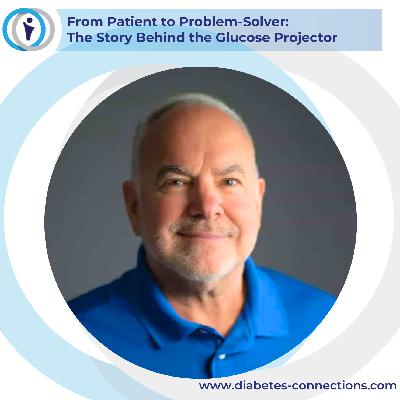




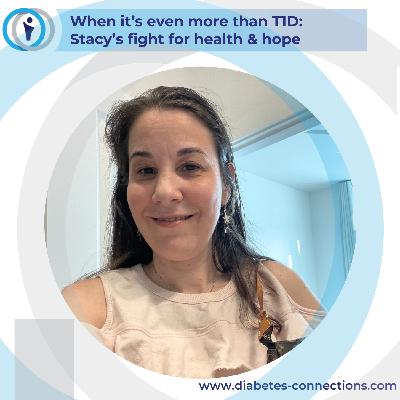



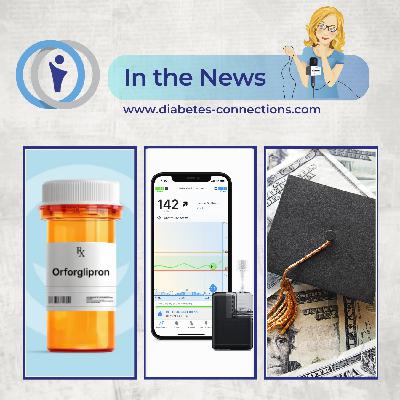






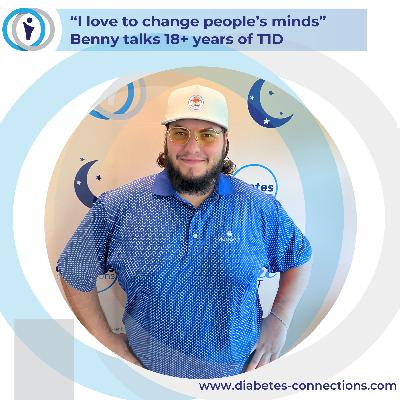

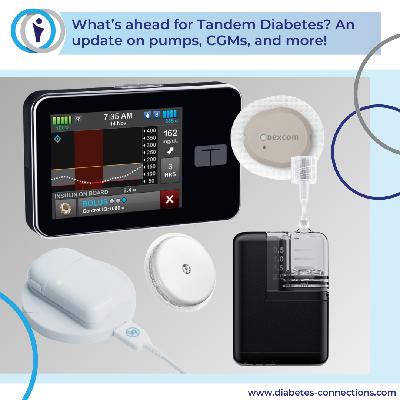



I ♥️ this episode! I've listened to it multiple times...the ideas give me so much hope!
I will checkout the diabetes summit online in oct 2017.
great POD cast. listen to it weekly